What it's like to have the fastest internet in the country
Tearing up my neighborhood in the name of speed.
How fast is it?
What do you do with a 2Gbps? Anything you want. You want games, I've got games. Sometimes they're not downloaded yet, which means I have to wait for this:
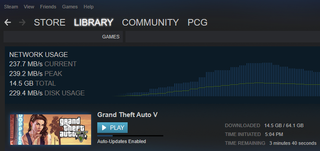
In reality, not many services will be able to hit the ceiling on a 2Gbps fiber connection. Google and Amazon cloud services can likely fill up the pipe just fine, but most businesses get by on far less bandwidth.
Those of you that use online backup services like Backblaze—I use it—might be interested to know that files don't necessarily transfer at full speeds. This is because when you're transferring a large amount of very small files, things don't go very quickly. You'll need multiple TCP streams to get decent speeds. Transferring a huge file on the other hand goes fast.
Steam was able to approach the ceiling on my connection quite easily. I tried downloading a fresh copy of Grand Theft Auto 5 from Steam. The game is over 64GB and finished downloading in 3 minutes and 52 seconds. This is faster than you can copy to a hard drive or a USB stick, and it's actually faster than the theoretical 2Gbps speed by about 10 percent.
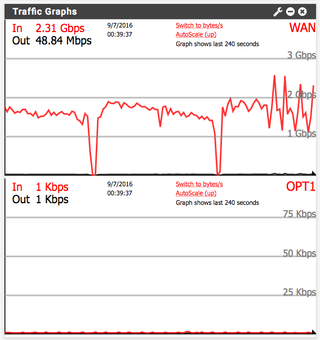
After attempting—and failing—to find a speedtest.net server that could max out my connection, I had to resort to using Google Fiber's own speed test service. First, here's the connection we have at PC Gamer's office:
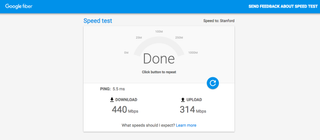
And here's mine:
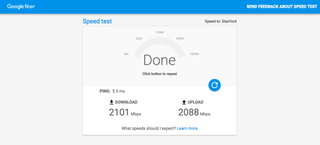
That's fast, though technically, it's not quite the fastest internet in the US. There are several very small local ISPs that now offer 10G speeds. EPB in Chattanooga, TN, offers 10G fiber to the house for $300 per month, the same price I'm paying Comcast now for 2Gbps. Another ISP called US Internet, located in Minneapolis, MN, offers residential fiber connections up to 10G in both directions for $300, or 2.5Gbps for $100/month—a third of what I'm paying in San Jose.
PC Gamer Newsletter
Sign up to get the best content of the week, and great gaming deals, as picked by the editors.
USI's residential fiber service isn't available outside of a very small patch of town, and the same goes for EPB. For all intents and purposes, the 10G services from both companies is only available to a very small group in a select patch of land. But if PC Gamer ever relocates to Chattanooga, I'll be first in line for an upgrade.
How fast is 10G fiber? You'd have to use a NVMe PCIe SSD, like Intel's 750 series SSD, just to be able to write whatever it is you're downloading. GTA5 would have downloaded in less than 1 minute (assuming Steam could keep up).
To Comcast's credit, it has deployed a nationwide fiber network, compared to small patches from smaller ISPs that only a handful of people can subscribe to. Even if you have coax cable service from Comcast now, it's very likely that you're already on its hybrid fiber-coax network and the company would be willing to explore running fiber to your premise. Comcast tells me that its Gigabit Pro service is now available in all of its fiber service areas across the country. To find out if you're living in a fiber zone, give Comcast a call.
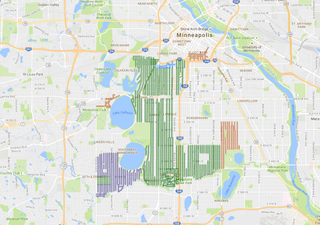
How does this all compare to the rest of the world? Residents in Singapore can get 2Gbps (with 1Gbps upload) fiber service for about $52 USD per month. Google's own one gigabit fiber service in the US costs just $70 a month, but there's no widespread availability. Comcast meanwhile can enjoy the fact that it has fiber deployed across the country in many areas, even though it still uses mostly cable DOCSIS 3.0 to provide service. The company is readying its DOCSIS 3.1 service, which will provide one gigabit speeds over regular cable. However, I'm told upload speeds will be at most 50Mbps. (I win.)
The future
There's no doubt about it: gigabit speeds are going to become more commonplace in the next two or three years. I mentioned earlier having fond memories of dial-up modems. Going from a 9600 baud modem in the late 80s to a 256Kbps DSL line a decade later felt revolutionary, and now many homes are running 50-100Mbps. What we once considered extraordinary has a way of becoming commonplace, given enough time. Thirty years later, my new connection is about 200,000 times faster than a 9600 baud modem.
It's also 100 times faster than a commonplace 20Mbps connection, which in turn is about 100 times faster than my old 256K DSL speed. These days, I pull my hair out when I'm forced to deal with a paltry 5Mbps connection, which often happens when I travel (hotel internet is the worst). I don't know how people can stand such slow speeds. Our data demands have scaled rapidly, and in another 10-20 years, even gigabit speeds might seem sluggish.
Is 2Gbps worth it? Most definitely—at least to me. Is it expensive? That depends on your location mostly and who the provider is. Obviously if you live in Asia, getting fiber can be relatively cheap. The biggest hurdle right now is deploying fiber to new locations.
A more pertinent question: does any of this help me game better? That also depends on your situation. For the most part though, you shouldn't have problems with gaming unless you're still gaming on dial-up. Most if not all entry-level to mid-range broadband offerings can handle gaming traffic just fine. It only becomes a problem when other people in the household are torrenting or streaming HD video. On 2Gbps, though, I could have a hundred 20Mbps HD video streams coming down simultaneously.
Another factor where a fiber connection might help is with download caps. Google Fiber has no caps, but many large cable and DSL providers now impose data caps, with the average somewhere around 300GB per month. As far as I know, there aren't any caps on residential fiber connections. Comcast's Gigabit Pro service has no caps of any kind, and that's actually part of the company's list of benefits for its fiber service. Downloading a single game like GTA5 can easily eat away at your monthly cap if you've got one.
At this point, I have to say I probably have faster Internet speeds than 99.999% of the US, and probably the world in general. In a chat with Comcast's PR team, I was asked, "So what are you doing with such insane speeds?" I said, "Downloading huge things illegally." We both had a good laugh, and then there was some silence. They then asked what it was like having 2 gigabit fiber metro Ethernet piped directly into my room. I said, "It's fucking awesome."
A big thanks to Callie N., and Tyler K., from the west coast fiber concierge team for making the adventure so awesome.
Most Popular



